特殊的形容词比较级顺口溜
形容词和副词比较级和最高级构成口诀
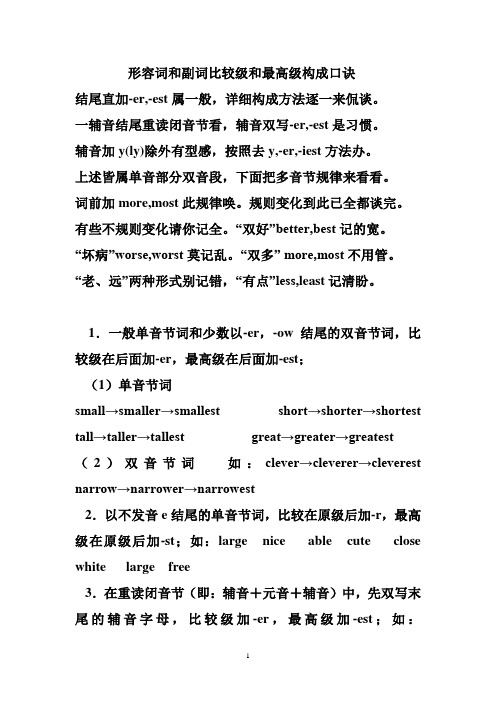
形容词和副词比较级和最高级构成口诀结尾直加-er,-est属一般,详细构成方法逐一来侃谈。
一辅音结尾重读闭音节看,辅音双写-er,-est是习惯。
辅音加y(ly)除外有型感,按照去y,-er,-iest方法办。
上述皆属单音部分双音段,下面把多音节规律来看看。
词前加more,most此规律唤。
规则变化到此已全都谈完。
有些不规则变化请你记全。
“双好”better,best记的宽。
“坏病”worse,worst莫记乱。
“双多” more,most不用管。
“老、远”两种形式别记错,“有点”less,least记清盼。
1.一般单音节词和少数以-er,-ow结尾的双音节词,比较级在后面加-er,最高级在后面加-est;(1)单音节词small→smaller→smallest short→shorter→shortest tall→taller→tallest great→greater→greatest (2)双音节词如:clever→cleverer→cleverest narrow→narrower→narrowest2.以不发音e结尾的单音节词,比较在原级后加-r,最高级在原级后加-st;如:large nice able cute close white large free3.在重读闭音节(即:辅音+元音+辅音)中,先双写末尾的辅音字母,比较级加-er,最高级加-est;如:big→bigger→biggest hot→hotter→hottest fat→fatter→fattestsad4.以“辅音字母+y”结尾的双音节词,把y改为i,比较级加-er,最高级加-est;如:easy→easier→easiest heavy→heavier→heaviestbusy→busier→busiest happy→happier→happiest5.其他双音节词和多音节词,比较级在前面加more,最高级在前面加most;如:beautiful→more beautiful→most beautifuldifferent→more different→most differenteasily→more easily→mos t easily注意:(1)形容词最高级前通常必须用定冠词the,副词最高级前可不用。
副词形容词比较级最高级小口诀
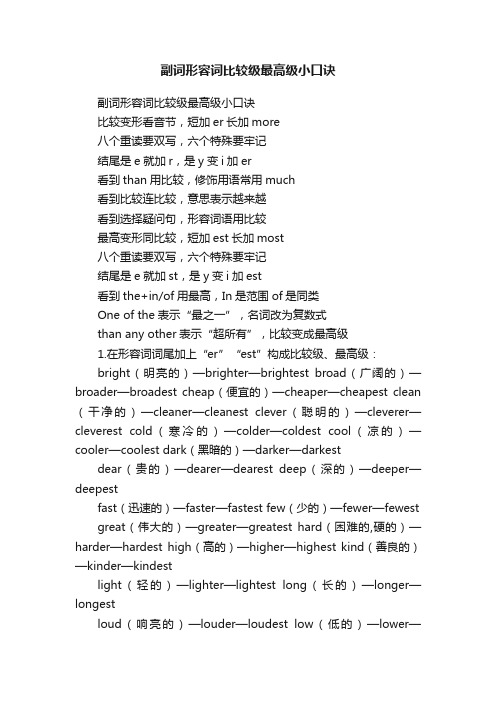
副词形容词比较级最高级小口诀副词形容词比较级最高级小口诀比较变形看音节,短加er长加more八个重读要双写,六个特殊要牢记结尾是e就加r,是y变i加er看到than用比较,修饰用语常用much看到比较连比较,意思表示越来越看到选择疑问句,形容词语用比较最高变形同比较,短加est长加most八个重读要双写,六个特殊要牢记结尾是e就加st,是y变i加est看到the+in/of用最高,In是范围of是同类One of the表示“最之一”,名词改为复数式than any other表示“超所有”,比较变成最高级1.在形容词词尾加上“er”“est”构成比较级、最高级:bright(明亮的)—brighter—brightest broad(广阔的)—broader—broadest cheap(便宜的)—cheaper—cheapest clean (干净的)—cleaner—cleanest clever(聪明的)—cleverer—cleverest cold(寒冷的)—colder—coldest cool(凉的)—cooler—coolest dark(黑暗的)—darker—darkestdear(贵的)—dearer—dearest deep(深的)—deeper—deepestfast(迅速的)—faster—fastest few(少的)—fewer—fewest great(伟大的)—greater—greatest hard(困难的,硬的)—harder—hardest high(高的)—higher—highest kind(善良的)—kinder—kindestlight(轻的)—lighter—lightest long(长的)—longer—longestloud(响亮的)—louder—loudest low(低的)—lower—lowestnear(近的)—nearer—nearest new(新的)—newer—newestpoor(穷的)—poorer—poorest quick(快的)—quicker—quickestquiet(安静的)—quieter—quietest rich(富裕的)—richer—richestshort(短的)—shorter—shortest slow(慢的)—slower—slowestsmall(小的)—smaller—smallest smart(聪明的)—smarter—smartest soft(柔软的)—softer—softest strong(强壮的)—stronger—strongest sweet(甜的)—sweeter—sweetest tall(高的)-taller-tallestthick(厚的)—thicker—thickest warm(温暖的)—warmer—warmest weak(弱的)—weaker—weakest young(年轻的)—younger—youngest 2.双写最后一个字母,再加上“er”“est”构成比较级、最高级:big(大的)—bigger—biggest fat(胖的)—fatter—fattesthot(热的)—hotter—hottest red(红的)—redder—reddestsad(伤心的)—sadder—saddest thin(瘦的)—thinner—thinnestwet(湿的)—wetter—wettest mad(疯的)—madder—maddest3.以不发音的字母e结尾的形容词,加上“r”、“st”构成比较级、最高级:able(能干的)—abler—ablest brave(勇敢的)—braver—bravestclose(接近的)—closer—closest fine(好的,完美的)—finer—finestlarge(巨大的)—larger—largest late(迟的)—later—latestnice(好的)—nicer—nicest ripe(成熟的)—riper—ripestrude(粗鲁的)—ruder—rudest safe(安全的)—safer—safeststrange(奇怪的)—stranger—strangest wide(宽广的)—wider—widestwise(睿智的,聪明的)—wiser—wisest white(白的)—whiter—whitest4.以字母y结尾的形容词,把y改为i,再加上“er”、“est”构成比较级、最高级:busy(忙碌的)—busier—busiest dirty(脏的)—dirtier—dirtiestdry(干燥的)—drier—driest early(早的)—earlier—earliesteasy(容易的)—easier—easiest friendly(友好的)—friendlier—friendliestfunny(好玩的)—funnier—funniest happy(开心的)—happier—happiest healthy(健康的)—healthier—healthiest heavy(重的)—heavier—heaviest hungry(饿的)—hungrier—hungriest lazy(懒惰的)—lazier—laziestlucky(幸运的)—luckier—luckiest naughty(调皮的)—naughtier—naughtiest noisy(嘈杂的)—noisier—noisiest pretty (美丽的)—prettier—prettiestsilly(傻的)—sillier—silliest spicy(辣的)—spicier—spiciest thirsty(渴的)—thirstier—thirstiest ugly(丑的)—uglier—ugliest5.双音节、多音节形容词,在单词前面加上“more”“most”构成比较级、最高级:afraid(害怕的)—more afraid—most afraid beautiful(美丽的)—more beautiful—most beautifulcareful(仔细的)—more careful—most carefulcheerful(开心的)—more cheerful—most cheerfulcrowded(拥挤的)—more crowded—most crowdeddangerous(危险的)—more dangerous—most dangerous delicious(美味的)—more delicious—most deliciousdifficult(困难的)—more difficult—most difficultexciting(令人兴奋的)—more exciting—most excitingexpensive(昂贵的)—more expensive—most expensivefamous(著名的)—more famous—most famousfrightened(受惊的)—more frightened—most frightened frightening(令人害怕的)—more frightening—most frighteninghard-working(勤奋的)—more hard-working—most hard-workinghelpful(有帮助的)—more helpful—most helpfulhonest(诚实的)—more honest—most honestimportant(重要的)—more important—most importantinteresting(有趣的)—more interesting—most interesting polite(有礼貌的)—more polite—most politeterrible(可怕的)—more terrible—most terribletired(累的)—more tired—most tired6.不规则变化的形容词:good(好的)/ well(好的)—better—bestbad(坏的)/ badly(坏的)/ ill(病的)—worse—worstmany(多的)/ much(多的)—more—mostlittle(少的)—less—leastold(老的)—older/ elder—oldest/ eldestfar(远的)—farther/ further—farthest furthest。
形容词及比较级用法顺口溜
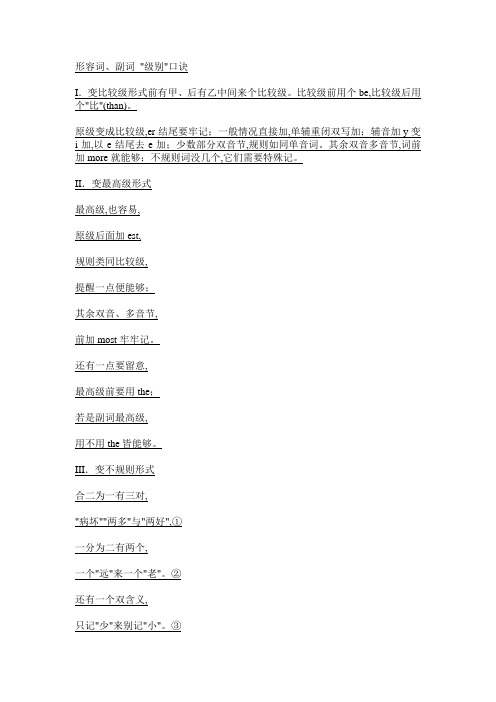
形容词、副词"级别"口诀I.变比较级形式前有甲、后有乙中间来个比较级。
比较级前用个be,比较级后用个"比"(than)。
原级变成比较级,er结尾要牢记;一般情况直接加,单辅重闭双写加;辅音加y变i加,以e结尾去e加;少数部分双音节,规则如同单音词。
其余双音多音节,词前加more就能够;不规则词没几个,它们需要特殊记。
II.变最高级形式最高级,也容易,原级后面加est,规则类同比较级,提醒一点便能够;其余双音、多音节,前加most牢牢记。
还有一点要留意,最高级前要用the;若是副词最高级,用不用the皆能够。
III.变不规则形式合二为一有三对,"病坏""两多"与"两好",①一分为二有两个,一个"远"来一个"老"。
②还有一个双含义,只记"少"来别记"小"。
③注:①ill/ bad→worse→worst; many/ much→more→most; good/well→better→best②far→farther/further→farthest/furthest; old/older/elder→oldest/ eldest③little→less→least形容词比较等级形容词最高级前不加the的情况在句中使用形容词最高级时,一般要加定冠词the.但以下几种情况,最高级之前不加定冠词。
一、如果形容词最高级用来增强语气,表示"非常、极其"的意思时,前面一般不用定冠词,但有时能够加不定冠词。
例如:He is a most careful student in our class. 他是我们班上一个非常细心的学生。
She is in closest touch with us .她和我们保持非常密切的联系。
副词形容词比较级最高级小口诀

副词形容词比较级最高级小口诀比较变形看音节,短加er长加more八个重读要双写,六个特殊要牢记结尾是e就加r,是y变i加er看到than用比较,修饰用语常用much看到比较连比较,意思表示越来越看到选择疑问句,形容词语用比较最高变形同比较,短加est长加most八个重读要双写,六个特殊要牢记结尾是e就加st,是y变i加est看到the+in/of用最高,In是范围of是同类One of the表示“最之一”,名词改为复数式than any other表示“超所有”,比较变成最高级1.在形容词词尾加上“er”“est”构成比较级、最高级:bright(明亮的)—brighter—brightest broad(广阔的)—broader—broadest cheap(便宜的)—cheaper—cheapest clean(干净的)—cleaner—cleanest clever(聪明的)—cleverer—cleverest cold(寒冷的)—colder—coldest cool(凉的)—cooler—coolest dark(黑暗的)—darker—darkestdear(贵的)—dearer—dearest deep(深的)—deeper—deepestfast(迅速的)—faster—fastest few(少的)—fewer—fewestgreat(伟大的)—greater—greatest hard(困难的,硬的)—harder—hardest high(高的)—higher—highest kind(善良的)—kinder—kindestlight(轻的)—lighter—lightest long(长的)—longer—longestloud(响亮的)—louder—loudest low(低的)—lower—lowestnear(近的)—nearer—nearest new(新的)—newer—newestpoor(穷的)—poorer—poorest quick(快的)—quicker—quickestquiet(安静的)—quieter—quietest rich(富裕的)—richer—richestshort(短的)—shorter—shortest slow(慢的)—slower—slowestsmall(小的)—smaller—smallest smart(聪明的)—smarter—smartest soft(柔软的)—softer—softest strong(强壮的)—stronger—strongest sweet(甜的)—sweeter—sweetest tall(高的)-taller-tallestthick(厚的)—thicker—thickest warm(温暖的)—warmer—warmest weak(弱的)—weaker—weakest young(年轻的)—younger—youngest 2.双写最后一个字母,再加上“er”“est”构成比较级、最高级:big(大的)—bigger—biggest fat(胖的)—fatter—fattesthot(热的)—hotter—hottest red(红的)—redder—reddestsad(伤心的)—sadder—saddest thin(瘦的)—thinner—thinnestwet(湿的)—wetter—wettest mad(疯的)—madder—maddest3.以不发音的字母e结尾的形容词,加上“r”、“st”构成比较级、最高级:able(能干的)—abler—ablest brave(勇敢的)—braver—bravestclose(接近的)—closer—closest fine(好的,完美的)—finer—finestlarge(巨大的)—larger—largest late(迟的)—later—latestnice(好的)—nicer—nicest ripe(成熟的)—riper—ripestrude(粗鲁的)—ruder—rudest safe(安全的)—safer—safeststrange(奇怪的)—stranger—strangest wide(宽广的)—wider—widestwise(睿智的,聪明的)—wiser—wisest white(白的)—whiter—whitest4.以字母y结尾的形容词,把y改为i,再加上“er”、“est”构成比较级、最高级:busy(忙碌的)—busier—busiest dirty(脏的)—dirtier—dirtiestdry(干燥的)—drier—driest early(早的)—earlier—earliesteasy(容易的)—easier—easiest friendly(友好的)—friendlier—friendliestfunny(好玩的)—funnier—funniest happy(开心的)—happier—happiest healthy(健康的)—healthier—healthiest heavy(重的)—heavier—heaviest hungry(饿的)—hungrier—hungriest lazy(懒惰的)—lazier—laziestlucky(幸运的)—luckier—luckiest naughty(调皮的)—naughtier—naughtiest noisy(嘈杂的)—noisier—noisiest pretty(美丽的)—prettier—prettiestsilly(傻的)—sillier—silliest spicy(辣的)—spicier—spiciestthirsty(渴的)—thirstier—thirstiest ugly(丑的)—uglier—ugliest5.双音节、多音节形容词,在单词前面加上“more”“most”构成比较级、最高级:afraid(害怕的)—more afraid—most afraidbeautiful(美丽的)—more beautiful—most beautifulcareful(仔细的)—more careful—most carefulcheerful(开心的)—more cheerful—most cheerfulcrowded(拥挤的)—more crowded—most crowdeddangerous(危险的)—more dangerous—most dangerousdelicious(美味的)—more delicious—most deliciousdifficult(困难的)—more difficult—most difficultexciting(令人兴奋的)—more exciting—most excitingexpensive(昂贵的)—more expensive—most expensivefamous(著名的)—more famous—most famousfrightened(受惊的)—more frightened—most frightenedfrightening(令人害怕的)—more frightening—most frighteninghard-working(勤奋的)—more hard-working—most hard-workinghelpful(有帮助的)—more helpful—most helpfulhonest(诚实的)—more honest—most honestimportant(重要的)—more important—most importantinteresting(有趣的)—more interesting—most interestingpolite(有礼貌的)—more polite—most politeterrible(可怕的)—more terrible—most terribletired(累的)—more tired—most tired6.不规则变化的形容词:good(好的)/ well(好的)—better—bestbad(坏的)/ badly(坏的)/ ill(病的)—worse—worstmany(多的)/ much(多的)—more—mostlittle(少的)—less—leastold(老的)—older/ elder—oldest/ eldestfar(远的)—farther/ further—farthest furthest。
英语语法怎么学 20首顺口溜能帮到你
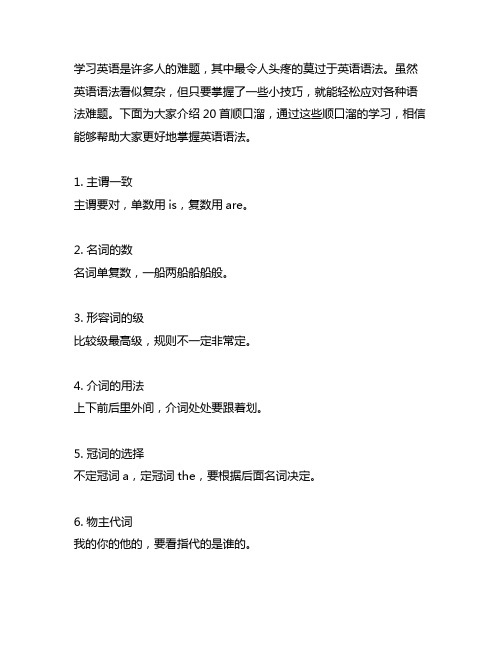
学习英语是许多人的难题,其中最令人头疼的莫过于英语语法。
虽然英语语法看似复杂,但只要掌握了一些小技巧,就能轻松应对各种语法难题。
下面为大家介绍20首顺口溜,通过这些顺口溜的学习,相信能够帮助大家更好地掌握英语语法。
1. 主谓一致主谓要对,单数用is,复数用are。
2. 名词的数名词单复数,一船两船船船般。
3. 形容词的级比较级最高级,规则不一定非常定。
4. 介词的用法上下前后里外间,介词处处要跟着划。
5. 冠词的选择不定冠词a,定冠词the,要根据后面名词决定。
6. 物主代词我的你的他的,要看指代的是谁的。
7. 动词的时态过去现在将来时,要把握好时态的使用。
8. 宾语从句宾语从句主谓宾,语序要和主句保持一致。
9. 名词性从句主语从句、宾语从句,要注意从句的位置安排。
10. 分词的用法分词做伴随状语,要注意时态和主语的一致。
11. 句子成分主谓宾定状补,要分清每个成分的位置。
12. 定语从句关系代词引导,关联词放在引导词后。
13. 倒装句行为动词或情态动词,置于主语之前。
14. 虚拟语气与现在相反用过去,与过去事实用过去完成。
15. 介词短语与动词名词形容词,结合紧密意义模糊。
16. 并列连词and, or, but不难识,用在并列句两边沿。
17. 主动被动主动宾和谓宾,有时候意思不太一样。
18. 句子类型陈述疑问感叹祈使,每种句子意思不一样。
19. 直接间接问人物和物品,最后不用再说谁。
20. 句子的韵律表达思想语气情感,要根据需要调整音调。
以上20首顺口溜,涵盖了英语语法的基本知识点,通过这些顺口溜的学习,相信能够帮助大家更好地掌握英语语法。
希望大家在学习英语语法的过程中能够多加练习,不断提升自己的语法水平。
学习英语是一项艰巨的任务,尤其是对于非母语人士来说,英语语法往往是最令人头痛的部分。
然而,通过掌握一些小技巧和口诀,我们可以更轻松地理解和运用英语语法规则。
下面将继续介绍更多有趣的口诀,帮助大家更好地掌握英语语法。
形容词及比较级用法顺口溜word版本

形容词、副词"级别"口诀I.变比较级形式前有甲、后有乙中间来个比较级。
比较级前用个be,比较级后用个"比"(than)。
原级变成比较级,er结尾要牢记;一般情况直接加,单辅重闭双写加;辅音加y变i加,以e结尾去e加;少数部分双音节,规则如同单音词。
其余双音多音节,词前加more就可以;不规则词没几个,它们需要特殊记。
II.变最高级形式最高级,也容易,原级后面加est,规则类同比较级,提醒一点便可以;其余双音、多音节,前加most牢牢记。
还有一点要留意,最高级前要用the;若是副词最高级,用不用the皆可以。
III.变不规则形式合二为一有三对,"病坏""两多"与"两好",①一分为二有两个,一个"远"来一个"老"。
②还有一个双含义,只记"少"来别记"小"。
③注:①ill/ bad→worse→worst; many/ much→more→most; good/well→better→best②far→farther/further→farthest/furthest; old/older/elder→oldest/ eldest③little→less→least形容词比较等级形容词最高级前不加the的情况在句中使用形容词最高级时,一般要加定冠词the.但以下几种情况,最高级之前不加定冠词。
一、如果形容词最高级用来加强语气,表示"非常、极其"的意思时,前面一般不用定冠词,但有时可以加不定冠词。
例如:He is a most careful student in our class. 他是我们班上一个非常细心的学生。
She is in closest touch with us .她和我们保持非常密切的联系。
形容词比较级构成方法的记忆歌诀

二、形容词比拟级构成方法的记忆歌诀:两者之间作比拟,尾巴er少不了;一般词尾加er,有e词尾加r;单一辅音单音节,双写词尾加er辅音加y很重要,去y变i加er遇到双音和多音,最高级most放前最适宜。
三、形容词、副词比拟级和最高级局部用法歌诀:1.两者和三者、三者以上:两者比拟用than连接,三者比拟the在前;2.同级比拟歌诀:同级比拟用原级as…as…永不离,假设是否认加notas…as…否在前as…as…加not 只说两者有区别so…as…加not 后者总是强前者3.比拟级前常可放以下表修饰和程度的词:a little稍微, much得多, even更、还要,far得多, still要、还要, a lot, 得多rather相当。
四、形容词和副词比拟级、最高级的用法强调:定冠词在形容词最高级中使用但是在副词最高级中往往省略不用。
一. 写出以下各形容词的比拟级和最高级:1. nice _________2. fat _________3. slow _________4. dry _________5. happy _________6. wet _________7. much _________8. ill_________9. little _________ 10. bad _________11. thin _________12. far _________ 13. early _________ 14. careful________ 15. e*citing_______16.well______17.friendly________ 18. green_________ 19. few________ 20.busy_______二. 根据句意,用所括号所级形容词的比拟等级形式填空:1. mr. smith is _________ man in this office. (rich)2. winter is _________ season of the years. (cold)3. this radio is not so ________ as that one. (cheap)4. it is much _______ today than yesterday. (hot)5. she is a little ________ than her classmates. (careful)6. ________ people came to the meeting than last time. (many)7. which book is ________, this one or that one? (easy)8. my room is _______ than yours. (small)9. hainan is _______ from beijing than hunan. (far)10. skating is ___________ than swimming. (e*citing)11. jim is _______ than all the others. (honest)12. things are getting _______ and _______. (bad)13. the higher you climb, the _______ it will be. (cold)14. now our lives are being _________ and __________. (good)15. there are _______ boys than girls in our class. (few)16.the _______(hard) you work, the ________(happy) your parents will be.17.he is __________(tall) of the two.18.of all the subjects, he likes english _______(well).19.he runs __________(fast) of the three.20.he got _________(good) grades in his class.三、用适当形式填空:1. bob is _________ ( young ) than fred, but ___________ (tall) than fred.2. jim is not as ___________ (tall) as jack.3. almost all the students' faces are the samebut li deming looks _______ (fat) than before after the summer holidays.4.which is _________ (heavy), the hen or the chicken?5.-- how _________ (tall) is sally?-- she' s 1.55 metres ________ (tall). what about *iaoling?-- she' s only 1.40 metres ________ (tall).she is much _______ (short) than sally.she is also the _______ (short) girl in the class.6. he is ______ (bad) at learning maths. he is much _______ (bad) at chinese and he is the _________ (bad) at english.7. annie says sally is the ________ (kind) person in the world.8. he is one of the_________(friendly) people in the class, i think.9. a dictionary is much _________ (e*pensive) than a story-book.10. an orange is a little ______ (big) than an apple, but much ________ (small) than a watermelon.11. the changjiang river is the _______ (long) river in china.12. sue is a little ___________ (beautiful) than her sister.13. my room is not as _________ (big) as my brother' s.14.--how difficult is physics? --i' m not sure.-- is it ________ (difficult) than maths? -- I don’t think so.15.-- annie plays the piano very _________ (well).-- sue plays it _____ (well) than annie. and sally plays it the ______ (well).16. saturday is my _________ (busy) day in a week.17. her mother is getting ____________ (fat) and ________ (fat).18. i think it’s too e*pensive. i' d like a _____________ (cheap) one.19. he es to school much ____________ (early) than i.20. this book is not as _____________ (interesting) as that one.21. your classroom is __________ (wide) and ___________ (bright) than ours.22. practise as __________ (much) as you can.23. the ________ (much), the ____________ (good).24. nowadays(现在) english is __________( important )than any other subject, 1 think.25. most of the students think a lion is much ________ (dangerous) than a bear and it is the __________ (dangerous) animal in the world26. my brother is two years __________ (old) than me.27. tom is as ________(fat) as jim.28. is your sister __________(young) than you? yes,she is.29. who is ___________(thin),you or helen? helen is.30. whose pencil-bo* is __________(big),yours or hers? hers is.31. mary’s hair is as __________(long) as lucy’s.32.ben ______ (jump) ________ (high) than some of the boys in his class.33.________ nancy sing __________ (well) than helen? yes, she _____.34.fangfang is not as _________ (tall) as the other girls.35.my eyes are __________(big) than ________ (she)..36.which is ___________(heavy),the elephant or the pig?37.who gets up _________(early),tim or tom?38._____the girls get up_______(early) than the boys?no,they______.39. jim runs _____(slow). but ben runs _____(slow).40.the child doesn’t______(write) as ____(fast) as the students.41.he is as________(careful) as me, but mary doesn’t do her homework as______as me.四. 用of, than, in, as填空。
初二年级英语比较等级变化规律口诀
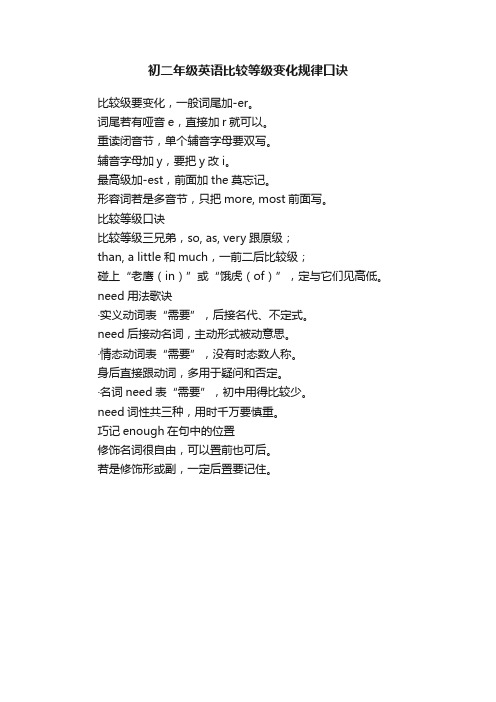
初二年级英语比较等级变化规律口诀
比较级要变化,一般词尾加-er。
词尾若有哑音e,直接加r就可以。
重读闭音节,单个辅音字母要双写。
辅音字母加y,要把y改i。
最高级加-est,前面加the莫忘记。
形容词若是多音节,只把more, most前面写。
比较等级口诀
比较等级三兄弟,so, as, very跟原级;
than, a little和much,一前二后比较级;
碰上“老鹰(in)”或“饿虎(of)”,定与它们见高低。
need用法歌诀
·实义动词表“需要”,后接名代、不定式。
need后接动名词,主动形式被动意思。
·情态动词表“需要”,没有时态数人称。
身后直接跟动词,多用于疑问和否定。
·名词need表“需要”,初中用得比较少。
need词性共三种,用时千万要慎重。
巧记enough在句中的位置
修饰名词很自由,可以置前也可后。
若是修饰形或副,一定后置要记住。
形容词比较级最高级的变化规则及口诀
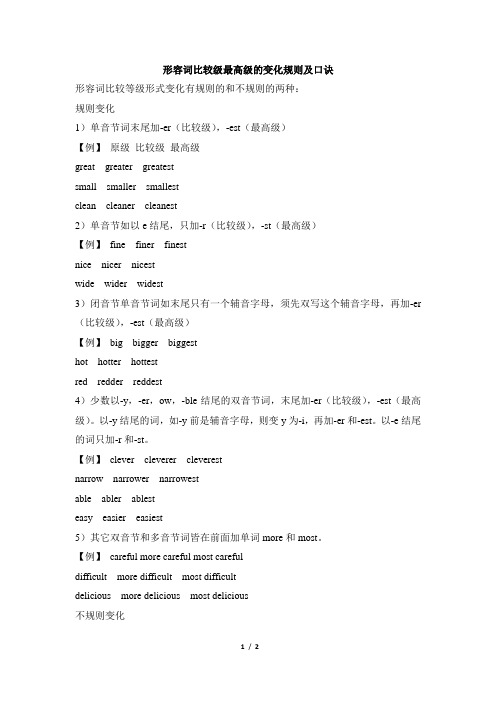
形容词比较级最高级的变化规则及口诀形容词比较等级形式变化有规则的和不规则的两种:规则变化1)单音节词末尾加-er(比较级),-est(最高级)【例】原级比较级最高级great greater greatestsmall smaller smallestclean cleaner cleanest2)单音节如以e结尾,只加-r(比较级),-st(最高级)【例】fine finer finestnice nicer nicestwide wider widest3)闭音节单音节词如末尾只有一个辅音字母,须先双写这个辅音字母,再加-er (比较级),-est(最高级)【例】big bigger biggesthot hotter hottestred redder reddest4)少数以-y,-er,ow,-ble结尾的双音节词,末尾加-er(比较级),-est(最高级)。
以-y结尾的词,如-y前是辅音字母,则变y为-i,再加-er和-est。
以-e结尾的词只加-r和-st。
【例】clever cleverer cleverestnarrow narrower narrowestable abler ablesteasy easier easiest5)其它双音节和多音节词皆在前面加单词more和most。
【例】careful more careful most carefuldifficult more difficult most difficultdelicious more delicious most delicious不规则变化原级比较级最高级good/well better bestbad worse worstmany/much more mostlittle less leastfar farther/further farthest/furthest注:有些形容词一般没有比较等级。
形容词比较级不规则变化口诀
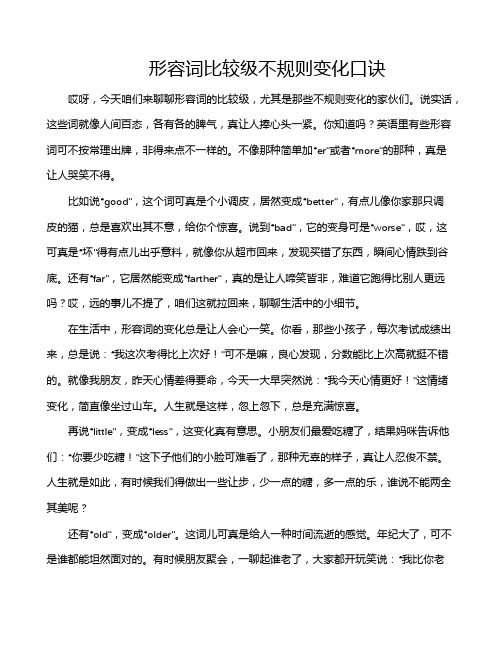
形容词比较级不规则变化口诀哎呀,今天咱们来聊聊形容词的比较级,尤其是那些不规则变化的家伙们。
说实话,这些词就像人间百态,各有各的脾气,真让人捧心头一紧。
你知道吗?英语里有些形容词可不按常理出牌,非得来点不一样的。
不像那种简单加“er”或者“more”的那种,真是让人哭笑不得。
比如说“good”,这个词可真是个小调皮,居然变成“better”,有点儿像你家那只调皮的猫,总是喜欢出其不意,给你个惊喜。
说到“bad”,它的变身可是“worse”,哎,这可真是“坏”得有点儿出乎意料,就像你从超市回来,发现买错了东西,瞬间心情跌到谷底。
还有“far”,它居然能变成“farther”,真的是让人啼笑皆非,难道它跑得比别人更远吗?哎,远的事儿不提了,咱们这就拉回来,聊聊生活中的小细节。
在生活中,形容词的变化总是让人会心一笑。
你看,那些小孩子,每次考试成绩出来,总是说:“我这次考得比上次好!”可不是嘛,良心发现,分数能比上次高就挺不错的。
就像我朋友,昨天心情差得要命,今天一大早突然说:“我今天心情更好!”这情绪变化,简直像坐过山车。
人生就是这样,忽上忽下,总是充满惊喜。
再说“little”,变成“less”,这变化真有意思。
小朋友们最爱吃糖了,结果妈咪告诉他们:“你要少吃糖!”这下子他们的小脸可难看了,那种无辜的样子,真让人忍俊不禁。
人生就是如此,有时候我们得做出一些让步,少一点的糖,多一点的乐,谁说不能两全其美呢?还有“old”,变成“older”。
这词儿可真是给人一种时间流逝的感觉。
年纪大了,可不是谁都能坦然面对的。
有时候朋友聚会,一聊起谁老了,大家都开玩笑说:“我比你老得多!”其实说白了,都是在互相打趣罢了。
生活不就是这么简单吗?大家一起在时间的洪流中嬉笑打闹,感叹岁月如梭。
再看看“many”和“much”,它们变成“more”可真是让人惊叹。
你有没有发现,咱们总是想要“更多”的东西,比如更多的时间、更多的快乐、甚至更多的零食。
小学英语形容词比较级顺口溜
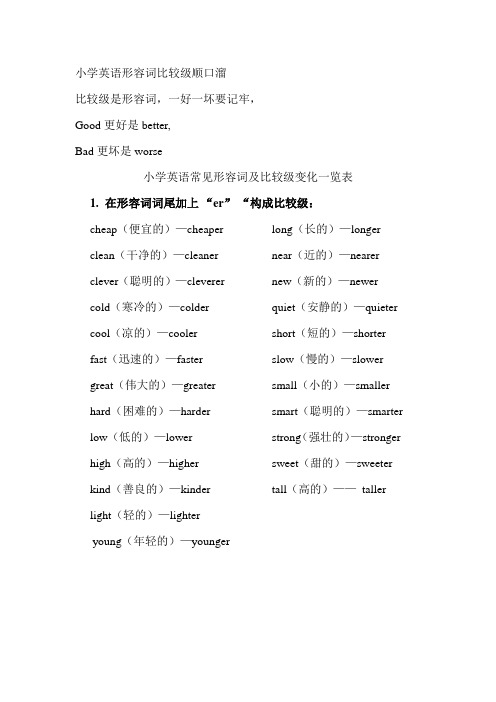
小学英语形容词比较级顺口溜比较级是形容词,一好一坏要记牢,Good更好是better,Bad更坏是worse小学英语常见形容词及比较级变化一览表1.在形容词词尾加上“er”“构成比较级:cheap(便宜的)—cheaper clean(干净的)—cleaner clever(聪明的)—cleverer cold(寒冷的)—colder cool(凉的)—cooler fast(迅速的)—faster great(伟大的)—greater hard(困难的)—harder low(低的)—lowerhigh(高的)—higher kind(善良的)—kinder light(轻的)—lighter long(长的)—longernear(近的)—nearer new(新的)—newerquiet(安静的)—quieter short(短的)—shorter slow(慢的)—slower small(小的)—smaller smart(聪明的)—smarter strong(强壮的)—stronger sweet(甜的)—sweetertall(高的)——talleryoung(年轻的)—younger2.双写最后一个字母,再加上“er”构成比较级:big(大的)—bigger fat(胖的)—fatterhot(热的)—hotter sad(伤心的)—sadder thin(瘦的)—thinner3.以不发音的字母e结尾的形容词,加上“r”构成比较级:close(接近的)—closer fine(好的)—finerlarge(巨大的)—larger late(迟的)—laternice(好的)—nicerwhite(白的)—whiter3.以字母y结尾的形容词,把y改为i,再加上“er”构成比较级:busy(忙碌的)—busier early(早的)—earlier easy(容易的)—easier friendly(友好的)—friendlier pretty(美丽的)—prettier funny(好玩的)—funnier happy(开心的)—happier healthy(健康的)—healthier heavy(重的)—heavier hungry(饿的)—hungrier lazy(懒惰的)—lazier lucky(幸运的)—luckier4.noisy(嘈杂的)—noisier 不规则变化的形容词:bad(坏的)—worse good(好的)—better far(远的)—farther ill(病的)—worse little(少的)—lessmany(多的)—more much well(好的)—betterold(年老的)—older5.在单词前面加上“more”构成比较级:afraid(害怕的)—more afraidbeautiful(美丽的)—more beautifuldelicious(美味的)—more deliciousexciting(令人兴奋的)—more excitingexpensive(昂贵的)—more expensivehard-working(勤奋的)—more hard-workinghelpful(有帮助的)—more helpfulinteresting(有趣的)—more interestingpolite(有礼貌的)—more politetired(累的)—more tired询问某人的身高:How tall +be动词+主语例如:How tall is your brother?(你的弟弟有多高?)He is 1.7 metres. (他有1.7米) 1.7(one point seven)询问某人的体重:How heavy +be动词+主语例如:How heavy is he?(你有多重?)He is 49 kilograms.(他有49公斤)A is taller thanB (A比B高.)(than前面的更)询问某人穿多大的鞋子:例如:What size are your shoes?(你穿多大的鞋子?) Size 7.(七号)Than 前面加er (比较级)有than 一定有比较;比较是两者之间进行的。
形容词、副词的比较级和最高级※数字的读法

hotter
thinner
hottest
thinnest
④ 以“辅音字母 + y”结尾的形容词要 变y为i,再加-er或-est。
原 级 比较级 easier busier angrier 最高级 easiest busiest angriest
easy busy angry
⑤ 两个或两个以上音节的形容词 ,在其 前加more/most + 形容词原级(部分双音 节和多音节词,在其前加more/most )
例如,当你听到“twenty thousand and four\'’写出20,“and four”意为后一组仅有 个位,即:004,那么,这个数字完整地写下 来就是20,004;若听到 “six million twenty thousand four hundre d and twenty—three,”则第一步先写:6, 020,再将最后一组423写在第一个逗号后面。 完整的数字为6,020,423。 由此:见这个三位一逗号的作用有多大。只要 我们在平时的训练中加强对三位数读写的训练, 能分辨“ty”与“teen\'’,并能借助这个不可 缺少的“逗号”,无论数字多么大,也不会对 我们造成障碍。
由以上一组数字可以看出,多位数由右向左每3 位有一逗号,这个逗号的作用非同小可,在记忆 数字时,它可以帮我们很大的忙! 逆向第一个逗号读thousand;向左再推三位, 第二个逗号读million;第三个逗号读billion;第 四个逗号就是trillion。 这几个逗号的作用在于,当我们听到若干 thousand时,立即写下这个数,并在其后打一 个逗号,并留出3位;当听到若干million,则写 下数字,并在后打一逗号,留出6位;听到若干 billion,方法同上,在后面留出9位,后面的 million、thousand依此法类推,让所有数字各 就其位。
- 1、下载文档前请自行甄别文档内容的完整性,平台不提供额外的编辑、内容补充、找答案等附加服务。
- 2、"仅部分预览"的文档,不可在线预览部分如存在完整性等问题,可反馈申请退款(可完整预览的文档不适用该条件!)。
- 3、如文档侵犯您的权益,请联系客服反馈,我们会尽快为您处理(人工客服工作时间:9:00-18:30)。
坏病两多并两好。
还有一词双意含,
只译少来不译小。
比较等级的运用
原级用在as…as间,
比较级用在than前。
and连接两个比较级,
说明“越来越怎样”。
三者以上最高级,
副词前可不加the。
Even, much和a little,
也常修饰比较级。
特殊的形容词、副词的比较级、最高级一分为二有两个,
一是远来一是老。
合二为一共三对,
坏病两多并两好。
还有一词双意含,
只译少来不译小。
比较等级的运用
原级用在as…as间,
比较级用在than前。
and连接两个比较级,
说明“越来越怎样”。
三者以上最高级,
副词前可不加the。
Even, much和a little,
也常修饰比较级。
特殊的形容词、副词的比较级、最高级一分为二有两个,
一是远来一是老。
合二为一共三对,
坏病两多并两好。
还有一词双意含,
只译少来不译小。
比较等级的运用
原级用在as…as间,
比较级用在than前。
and连接两个比较级,
说明“越来越怎样”。
三者以上最高级,坏病两多并两好。
还有一词双意含,
只译少来不译小。
比较等级的运用
原级用在as…as间,
比较级用在than前。
and连接两个比较级,
说明“越来越怎样”。
三者以上最高级,
副词前可不加the。
Even, much和a little,
也常修饰比较级。
特殊的形容词、副词的比较级、最高级一分为二有两个,
一是远来一是老。
合二为一共三对,
坏病两多并两好。
还有一词双意含,
只译少来不译小。
比较等级的运用
原级用在as…as间,
比较级用在than前。
and连接两个比较级,
说明“越来越怎样”。
三者以上最高级,
副词前可不加the。
Even, much和a little,
也常修饰比较级。
特殊的形容词、副词的比较级、最高级一分为二有两个,
一是远来一是老。
合二为一共三对,
坏病两多并两好。
还有一词双意含,
只译少来不译小。
比较等级的运用
原级用在as…as间,
比较级用在than前。
and连接两个比较级,
说明“越来越怎样”。
三者以上最高级,
坏病两多并两好。
还有一词双意含,
只译少来不译小。
比较等级的运用
原级用在as…as间,
比较级用在than前。
and连接两个比较级,
说明“越来越怎样”。
三者以上最高级,
副词前可不加the。
Even, much和a little,
也常修饰比较级。
特殊的形容词、副词的比较级、最高级一分为二有两个,
一是远来一是老。
合二为一共三对,
坏病两多并两好。
还有一词双意含,
只译少来不译小。
比较等级的运用
原级用在as…as间,
比较级用在than前。
and连接两个比较级,
说明“越来越怎样”。
三者以上最高级,
副词前可不加the。
Even, much和a little,
也常修饰比较级。
特殊的形容词、副词的比较级、最高级一分为二有两个,
一是远来一是老。
合二为一共三对,
坏病两多并两好。
还有一词双意含,
只译少来不译小。
比较等级的运用
原级用在as…as间,
比较级用在than前。
and连接两个比较级,
说明“越来越怎样”。
三者以上最高级,坏病两多并两好。
还有一词双意含,
只译少来不译小。
比较等级的运用
原级用在as…as间,
比较级用在than前。
and连接两个比较级,
说明“越来越怎样”。
三者以上最高级,
副词前可不加the。
Even, much和a little,
也常修饰比较级。
特殊的形容词、副词的比较级、最高级一分为二有两个,
一是远来一是老。
合二为一共三对,
坏病两多并两好。
还有一词双意含,
只译少来不译小。
比较等级的运用
原级用在as…as间,
比较级用在than前。
and连接两个比较级,
说明“越来越怎样”。
三者以上最高级,
副词前可不加the。
Even, much和a little,
也常修饰比较级。
特殊的形容词、副词的比较级、最高级一分为二有两个,
一是远来一是老。
合二为一共三对,
坏病两多并两好。
还有一词双意含,
只译少来不译小。
比较等级的运用
原级用在as…as间,
比较级用在than前。
and连接两个比较级,
说明“越来越怎样”。
三者以上最高级,。
